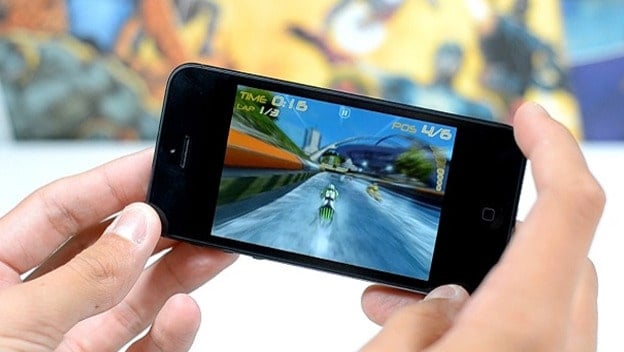We may get a new lease on handheld gaming…from the most unlikely of places.
If you’d told me five years ago that cell phone games would become so popular they’d actually be considered as an alternative to console gaming, I NEVER would have believed you. But here we are. In 2014, the sheer volume of those playing some type of mobile game is staggering. Chances are, 75% of you reading this either have played a handheld title on your smartphone recently, or at the very least, have downloaded one with the intent to play. Devices like the iPhone or rival Android have almost pushed traditional video game systems like the Nintendo DS to the backseat. With the huge amounts of revenue flowing in from mobile, many have looked to the future when more gaming is possibly done via the device in your front pocket rather than the one in your entertainment center.
But before we actually get there, a few things will definitely need to change.
The Achilles heel that I see regarding the future of mobile gaming as a legit console replacement is two-fold. I find these types of releases typically break down into one of two styles. First is the “tap” this or “swipe” that category (which actually makes up a good bulk of the industry). The second is more simplistic: the retail rerelease. Taking a game that is already an established hit on the consoles (like GTA: Vice City for example) and porting to a smartphone or tablet is one the easiest ways to double dip on a game’s success. Until the industry breaks out of that formula, it will never be considered anything more than just a way to waste time while you’re waiting for your bus or train to arrive. Established console names like the Xbox and PlayStation have generated billions of dollars for a consistent length of time (not to mention the decades spent establishing their names in the industry). If mobile gaming ever hopes to achieve top-billing on the same level of “next-gen,” it is imperative that we start seeing more innovative and out-of-the-box ideas. Simply filling the market with 420 different versions of Flappy Bird just isn’t going to cut it. But the real question is, how do they bust through the creative glass ceiling?
Enter Alex Seropian, co-creator of the iconic Halo franchise.
A series like Halo needs no introduction from me, as the very name speaks for itself. Even if you’re not a fan of Master Chief or FPS games in general, you can’t deny its success. Seropian, who recently raised over $5 million dollars (from the same investors who backed games like Angry Birds ), touted that their upcoming title Midnight Star aims to buck traditional mobile conventions in an attempt to appeal to “core” gamers. “Our plan is to build something with a permanence to it,” Seropian said “…It seems obvious to us that core gamers will move to mobile.”
I must say, coming from a guy who helped fund Bungie over 20 years ago, his opinions certainly carry a lot of weight with me. However, even if his currently in-development title does break the mold, his prediction of hardcore gamers jumping to mobile is a bit of a stretch even for me. I have no doubt that someone who took the FPS genre and redefined it with a game like Halo CAN and WILL bring ground-breaking new concepts to our smartphones. Having said that, I just can’t see something that is so easily lost between the couch cushions replacing our Dualshock controllers any time soon.

I do find myself looking to the future and wondering, “Will things really stay like this forever?” After all, we’ve had the same setup for years: a game system, a TV, a controller and a sofa. Are we destined to just sit inside this box forever? I’d like to think not, as recent breakthroughs in VR hopes to jolt us out of our 20+ year routine. With the huge influx of handheld gaming becoming mainstream, you have to question what role smartphones and tablets (hardware we’ve only dreamt about since the days of Star Trek: The Next Generation ) will play in changing our path. As technology becomes more advanced, it simultaneously gets smaller as well.
The one thing I know for sure is this: the landscape of video games in 2014 is completely different than that of 2004. Can you image what it will look like in 2024?
